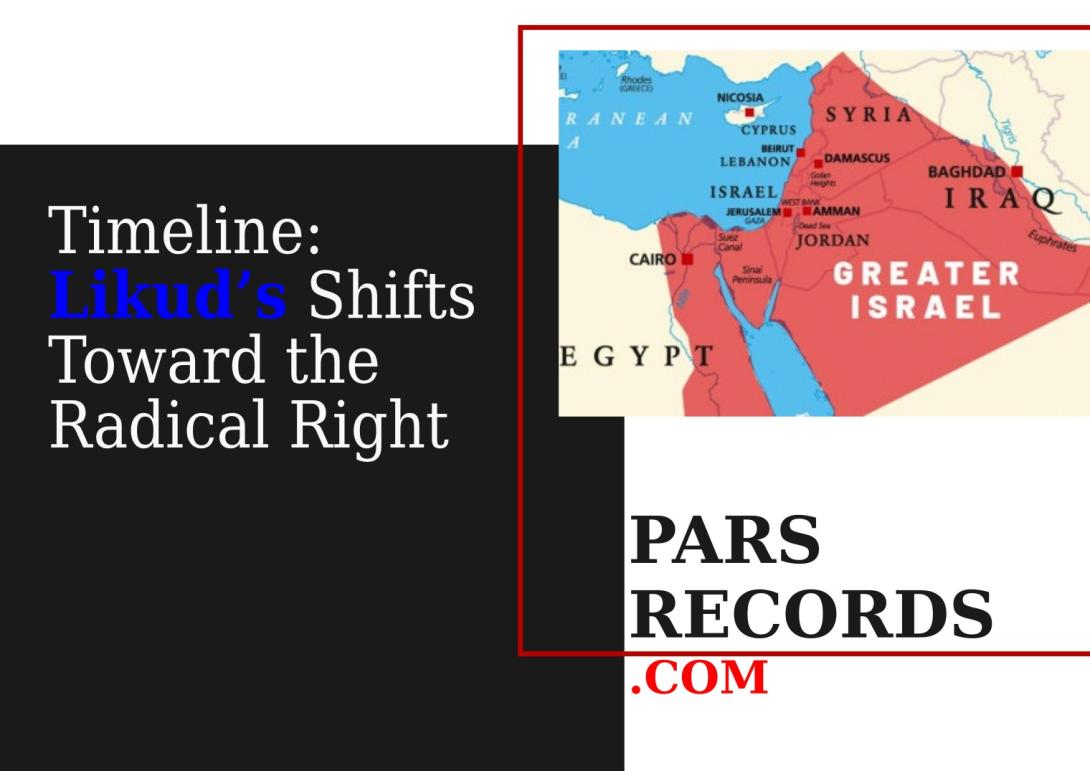Origins and Early Ideology (1948–1973)
Key Context:
Before Likud existed, its ideological seeds were planted in Revisionist Zionism, a movement founded by Ze’ev Jabotinsky in the 1920s.
- Core ideas: militant Jewish self-defense, emphasis on sovereignty over both banks of the Jordan River, rejection of socialist collectivism, and belief in a strong Jewish state rooted in nationalism.
- Post-1948: Jabotinsky’s followers formed the Herut Party, led by Menachem Begin, which represented a nationalist opposition to the Labour-Zionist establishment.
Ideological stance:
- Advocated “Eretz Yisrael Ha-Shlema” (“Greater Israel”)—sovereignty over all territories of biblical Israel.
- Strongly anti-Arab nationalist, though rhetorically democratic.
- Economically nationalist rather than neoliberal.
This ideological DNA later informed Likud’s core identity.
Formation of Likud and First Rise to Power (1973–1981)
1973 – Formation of Likud:
A coalition of right-wing and liberal parties merged into a single bloc named Likud (“The Consolidation”).
1977 – “The Revolution” (HaMahapach):
Menachem Begin led Likud to its first electoral victory, ending three decades of Labour dominance.
- Begin moderated his rhetoric to appeal to Mizrahi and working-class voters.
- Signed the Camp David Accords (1978) and peace with Egypt (1979), surprising many hard-liners.
Shift: Despite peace with Egypt, Likud deepened settlement activity in the West Bank, framing it as fulfilling a historic right. The “Greater Israel” ideal remained.
Net effect: Likud’s nationalism became state policy, but still within a democratic and constitutional framework.
Consolidation of the “Security Right” (1980s–Early 1990s)
Leaders: Yitzhak Shamir and later Benjamin Netanyahu (first term in the 1990s).
- Likud emphasized security, deterrence, and opposition to territorial concessions.
- The 1980s saw expansion of Jewish settlements under state support.
- The party framed Palestinian nationalism as a security threat rather than a legitimate political claim.
1988 – Party Platform Revision:
- Officially rejected the establishment of a Palestinian state.
- Asserted permanent Israeli control over Judea and Samaria (West Bank).
- Cemented an ideological shift from pragmatic nationalism to territorial maximalism.
Post-Oslo Reaction and Rise of Populist Nationalism (1993–2005)
1993–1995: Oslo Accords under Labour governments created a backlash within Likud.
- Likud positioned itself as the defender of Jewish land against “leftist betrayal.”
- Netanyahu emerged as a populist figure, adopting anti-elite, anti-media, and anti-peace rhetoric.
1996 – Netanyahu’s First Term:
- Balanced international pragmatism with domestic appeasement of right-wing settlers.
- Institutionalised suspicion of peace processes; advanced neoliberal reforms.
- Political style shifted toward charismatic populism—portraying himself as “protector of the nation” against external and internal enemies.
2005 – Gaza Disengagement and Party Split:
- Ariel Sharon’s decision to evacuate Gaza settlers caused an ideological rupture.
- Sharon left Likud to form Kadima; those who remained were the harder-line nationalists.
Outcome: Likud’s centre was hollowed out; the party became ideologically purer and more rigid.
Populism and Religious Nationalist Convergence (2009–2015)
2009 – Netanyahu’s Return to Power:
- Likud built coalitions with ultra-Orthodox and nationalist-religious parties.
- The party moved closer to the religious right, especially HaBayit HaYehudi and settler movements.
- Settlement expansion accelerated; rhetoric on security, Iran, and “delegitimisation” of dissent intensified.
2011–2015 – Anti-Democratic Legislation Trend:
- Bills restricting NGO funding, penalising boycotts, and limiting judicial oversight.
- 2014 “Nation-State Bill” draft—later passed in 2018—prioritised Jewish identity over equality.
Ideological hallmark:
- Fusion of ethno-nationalism and populism.
- Erosion of liberal-democratic norms in the name of Jewish sovereignty.
Alliance with the Far-Right Fringe (2019–2022)
Political Deadlock & Fragmentation:
- To secure power amid repeated elections, Likud sought alliances with far-right factions like Otzma Yehudit (linked to the banned Kach movement).
- Netanyahu personally brokered deals ensuring extremist parties entered Knesset blocs supporting him.
Key Themes:
- Delegitimisation of Arab parties and voters (“Arab turnout is dangerous”).
- Attacks on the judiciary, media, and police—framing them as enemies of “the people.”
- Online incitement and conspiracy narratives became normalized.
Result: The Overton window shifted dramatically rightward; ideas once considered fringe (annexation, judicial overhaul) entered mainstream discourse.
The Judicial Overhaul and Ultra-Nationalist Coalition (2022–Present)
2022–2023 – Formation of Netanyahu’s Sixth Government:
- Coalition includes Religious Zionism (Bezalel Smotrich), Otzma Yehudit (Itamar Ben-Gvir), and Noam (Avi Maoz)—openly extremist and homophobic parties.
- Likud serves as the senior partner, legitimising far-right actors in governance.
2023 – Judicial Overhaul Crisis:
- Proposed to weaken the Supreme Court, politicise judicial appointments, and limit judicial review.
- Massive domestic protests branded the reforms a threat to democracy.
- Netanyahu and Likud defended the moves as “restoring balance,” echoing global populist trends (Trump, Orbán).
2024–2025:
- Likud maintains alliance with religious-nationalist movements and settlement blocs.
- Security policy and rhetoric hardened further after Gaza conflicts, with increased tolerance for extreme nationalist rhetoric within government ranks.
Current Phase: Likud operates not merely as a conservative party but as a populist-nationalist front, aligning structurally and rhetorically with radical right movements globally.
Summary of Ideological Trajectory
| Era | Core Identity | Rightward Shift Indicators |
|---|---|---|
| 1970s–1980s | National-liberal Zionism | Settlement policy, anti-socialist reaction |
| 1990s | Security-based nationalism | Anti-Oslo backlash, populism under Netanyahu |
| 2000s | Post-Sharon purification | Loss of centrist faction, rise of hard-liners |
| 2010s | Populist nationalism | Nation-State law, attacks on judiciary & minorities |
| 2020s | Radical right coalition | Alliance with far-right parties, authoritarian governance trends |
Conclusion
Over five decades, Likud’s ideological centre of gravity has shifted markedly rightward—from a nationalist-liberal bloc into a populist-ethno-nationalist movement intertwined with religious extremism.
While the party remains formally democratic, its rhetoric, alliances, and legislative agenda increasingly reflect global radical-right characteristics:
- Majoritarian identity politics (Jewish supremacy over civic equality)
- Delegitimisation of opponents (media, judiciary, minorities)
- Authoritarian populism (rule “in the name of the people” against institutions)
This evolution underscores how mainstream parties can drift toward extremism when electoral incentives, demographic anxieties, and populist leadership combine.
PARSRECORDS.COM


Comments